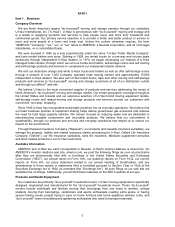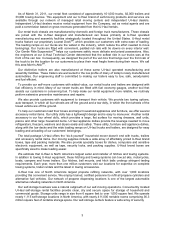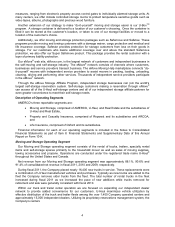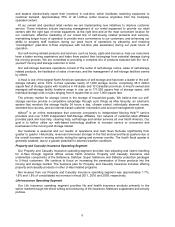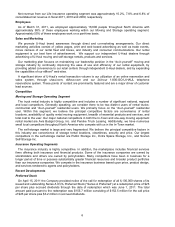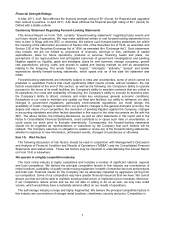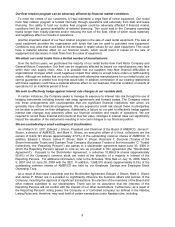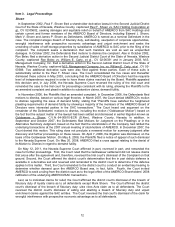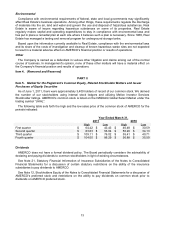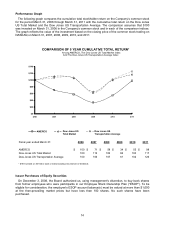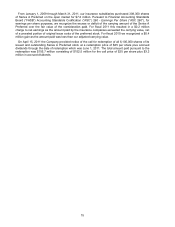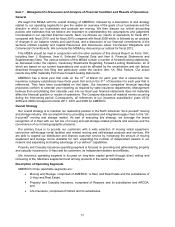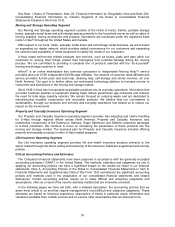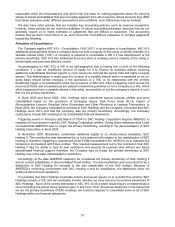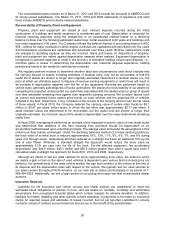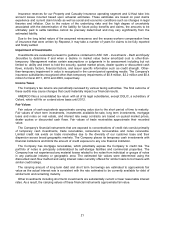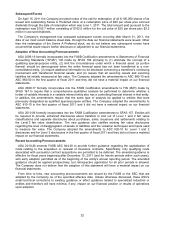U-Haul 2011 Annual Report Download - page 17
Download and view the complete annual report
Please find page 17 of the 2011 U-Haul annual report below. You can navigate through the pages in the report by either clicking on the pages listed below, or by using the keyword search tool below to find specific information within the annual report.
12
Item 3. Legal Proceedings
Shoen
In September 2002, Paul F. Shoen filed a shareholder derivative lawsuit in the Second Judicial District
Court of the State of Nevada, Washoe County, captioned Paul F. Shoen vs. SAC Holding Corporation et
al., CV 02-05602, seeking damages and equitable relief on behalf of AMERCO from SAC Holdings and
certain current and former members of the AMERCO Board of Directors, including Edward J. Shoen,
Mark V. Shoen and James P. Shoen as Defendants. AMERCO is named as a nominal Defendant in the
case. The complaint alleges breach of fiduciary duty, self-dealing, usurpation of corporate opportunities,
wrongful interference with prospective economic advantage and unjust enrichment and seeks the
unwinding of sales of self-storage properties by subsidiaries of AMERCO to SAC prior to the filing of the
complaint. The complaint seeks a declaration that such transfers are void as well as unspecified
damages. In October 2002, the Defendants filed motions to dismiss the complaint. Also in October 2002,
Ron Belec filed a derivative action in the Second Judicial District Court of the State of Nevada, Washoe
County, captioned Ron Belec vs. William E. Carty, et al., CV 02-06331 and in January 2003, M.S.
Management Company, Inc. filed a derivative action in the Second Judicial District Court of the State of
Nevada, Washoe County, captioned M.S. Management Company, Inc. vs. William E. Carty, et al., CV 03-
00386. Two additional derivative suits were also filed against these parties. Each of these suits is
substantially similar to the Paul F. Shoen case. The Court consolidated the five cases and thereafter
dismissed these actions in May 2003, concluding that the AMERCO Board of Directors had the requisite
level of independence required in order to have these claims resolved by the Board. Plaintiffs appealed
this decision and, in July 2006, the Nevada Supreme Court reversed the ruling of the trial court and
remanded the case to the trial court for proceedings consistent with its ruling, allowing the Plaintiffs to file
an amended complaint and plead in addition to substantive claims, demand futility.
In November 2006, the Plaintiffs filed an amended complaint. In December 2006, the Defendants filed
motions to dismiss, based on various legal theories. In March 2007, the Court denied AMERCO’s motion
to dismiss regarding the issue of demand futility, stating that “Plaintiffs have satisfied the heightened
pleading requirements of demand futility by showing a majority of the members of the AMERCO Board of
Directors were interested parties in the SAC transactions.” The Court heard oral argument on the
remainder of the Defendants’ motions to dismiss, including the motion (“Goldwasser Motion”) based on
the fact that the subject matter of the lawsuit had been settled and dismissed in earlier litigation known as
Goldwasser v. Shoen, C.V.N.-94-00810-ECR (D.Nev), Washoe County, Nevada. In addition, in
September and October 2007, the Defendants filed Motions for Judgment on the Pleadings or in the
Alternative Summary Judgment, based on the fact that the stockholders of the Company had ratified the
underlying transactions at the 2007 annual meeting of stockholders of AMERCO. In December 2007, the
Court denied this motion. This ruling does not preclude a renewed motion for summary judgment after
discovery and further proceedings on these issues. On April 7, 2008, the litigation was dismissed, on the
basis of the Goldwasser Motion. On May 8, 2008, the Plaintiffs filed a notice of appeal of such dismissal
to the Nevada Supreme Court. On May 20, 2008, AMERCO filed a cross appeal relating to the denial of
its Motion to Dismiss in regard to demand futility.
On May 12, 2011, the Nevada Supreme Court affirmed in part, reversed in part, and remanded the
case for further proceedings. First, the Court ruled that the Goldwasser settlement did not release claims
that arose after the agreement and, therefore, reversed the trial court’s dismissal of the Complaint on that
ground. Second, the Court affirmed the district court’s determination that the in pari delicto defense is
available in a derivative suit and reversed and remanded to the district court to determine if the defense
applies to this matter. Third, the Court remanded to the district court to conduct an evidentiary hearing to
determine whether demand upon the AMERCO Board was, in fact, futile. Fourth, the Court invited
AMERCO to seek a ruling from the district court as to the legal effect of the AMERCO Shareholders’ 2008
ratification of the underlying AMERCO/SAC transactions.
Last, as to individual claims for relief, the Court affirmed the district court’s dismissal of the breach of
fiduciary duty of loyalty claims as to all defendants except Mark Shoen. The Court affirmed the district
court’s dismissal of the breach of fiduciary duty: ultra vires Acts claim as to all defendants. The Court
reversed the district court’s dismissal of aiding and abetting a breach of fiduciary duty and unjust
enrichment claims against the SAC entities. The Court reversed the trial court’s dismissal of the claim for
wrongful interference with prospective economic advantage as to all defendants.


